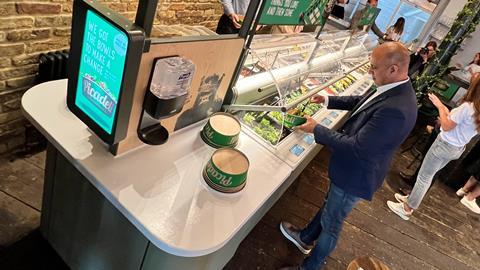Hi-tech salad bar specialist Picadeli rolls out new carbon labelling system after report finds shoppers have no way of knowing whether their eating habits are good for the planet
A new report claims it is extremely hard for consumers to gauge the sustainability of their own eating habits and therefore eat greener, especially when there is no kind of labelling system to guide them.
What’s more, it appears, the vast majority of shoppers have no idea what the UN’s target is when it comes to a meal’s carbon emissions.
Produced by healthy fast food company Picadeli and with data provided by Kantar, the latest annual Vegocracy Report reports that one in two (53 per cent) consumers believe clearer labelling would help them make more sustainable food choices.
At the same time, around a quarter (24 per cent) of respondents say they feel powerless to have any impact on their carbon footprint.
In the UK, Picadeli plans to introduce its tech-enabled smart salad bars to the market following the successful roll-out of more than 2,000 units elsewhere in Europe.
It wants consumers all across the continent to make better choices in terms of sustainable eating habits.
But it may face an uphill battle in the UK, where only 4 per cent of respondents say they see the environment as the most important consideration when choosing a meal.
More encouragingly, 57 per cent want to see labelling that tells them about their food’s carbon emissions, something they say would nudge them towards eating greener.
“We were shocked to discover such a low number of recipients with awareness around how their meal choices affect the climate, and wanted to take positive steps to help close this ‘green gap’ in knowledge,” says Picadeli CEO David von Laskowski.
New green label
To help address the lack of understanding, this month the group has rolled out a trademarked carbon labelling system called Climate Foodprint across its entire European salad bar network.
Based on a life-cycle assessment and field-to-fork estimate of a product’s total climate impact, it says this communicates its own products’ climate impact clearly.
According to the company, Picadeli salads’ climate impact is almost half that of the average European meal.
However, it accepts that it remains “impossible” for consumers to make informed decisions without mandatory carbon labelling.
It has also introduced Nutri-Score across its range of salads, a nutritional information scheme recommended by a number of EU countries, as well as the European Commission and World health Organization.
“This is also a big step in helping consumers make healthier choices, along with standardising our nutritional information,” Von Laskowski adds.
Click here to read the full 2023 Vegocracy Report.







